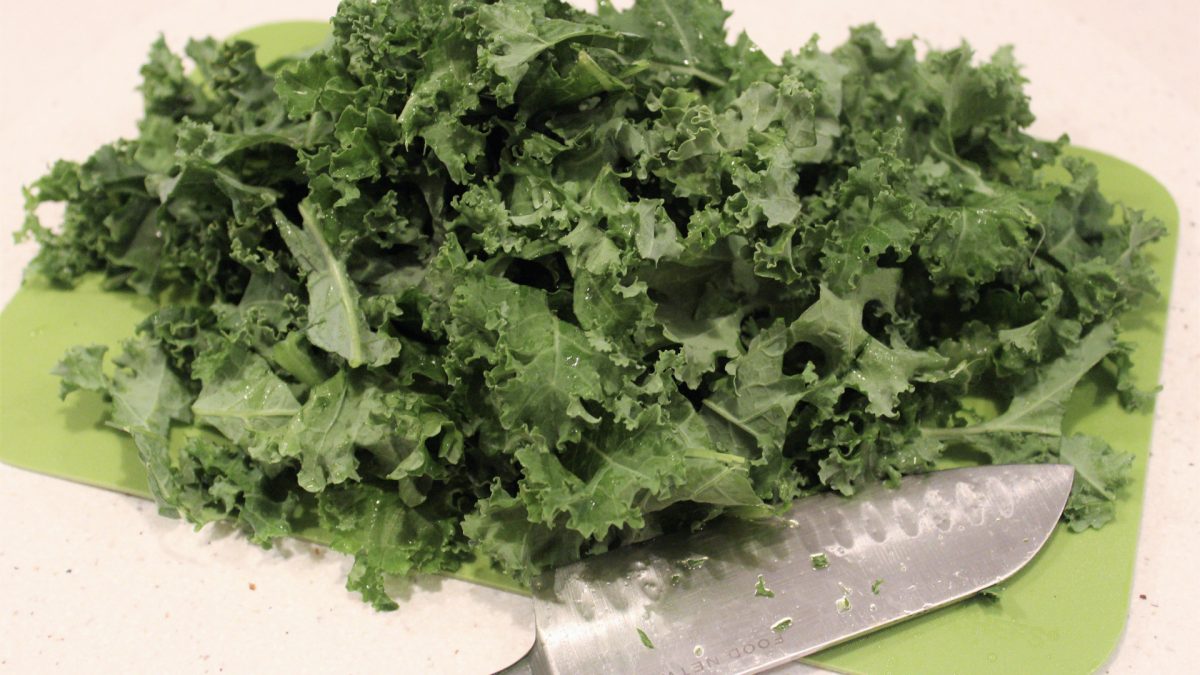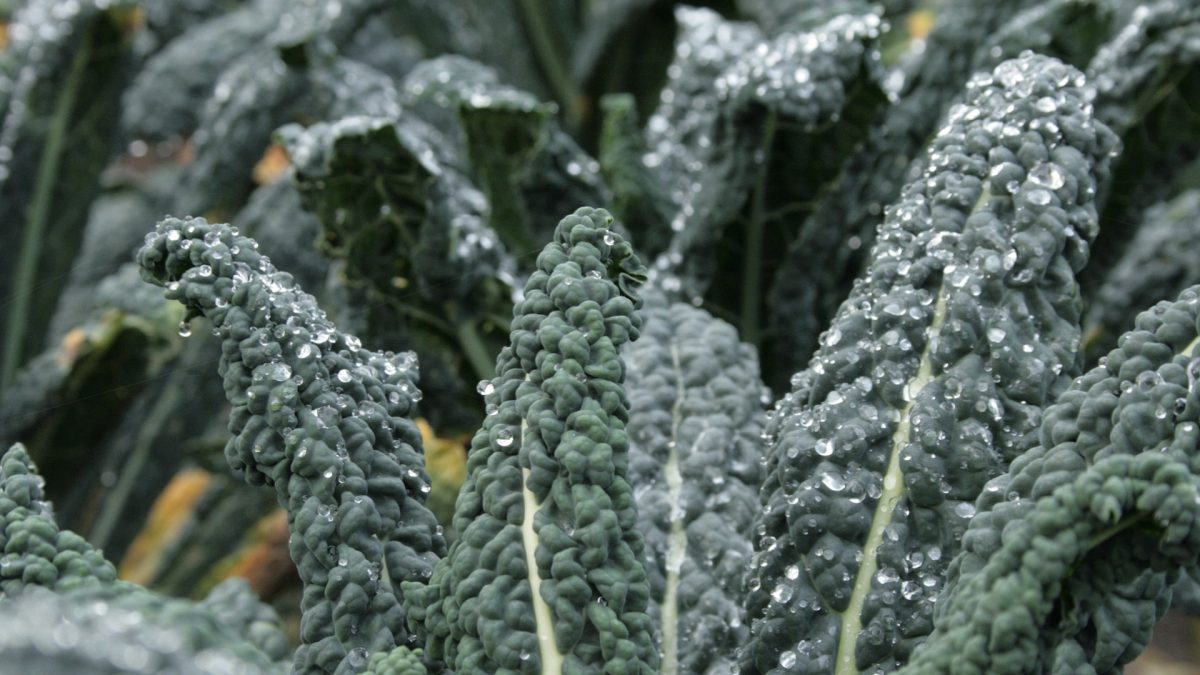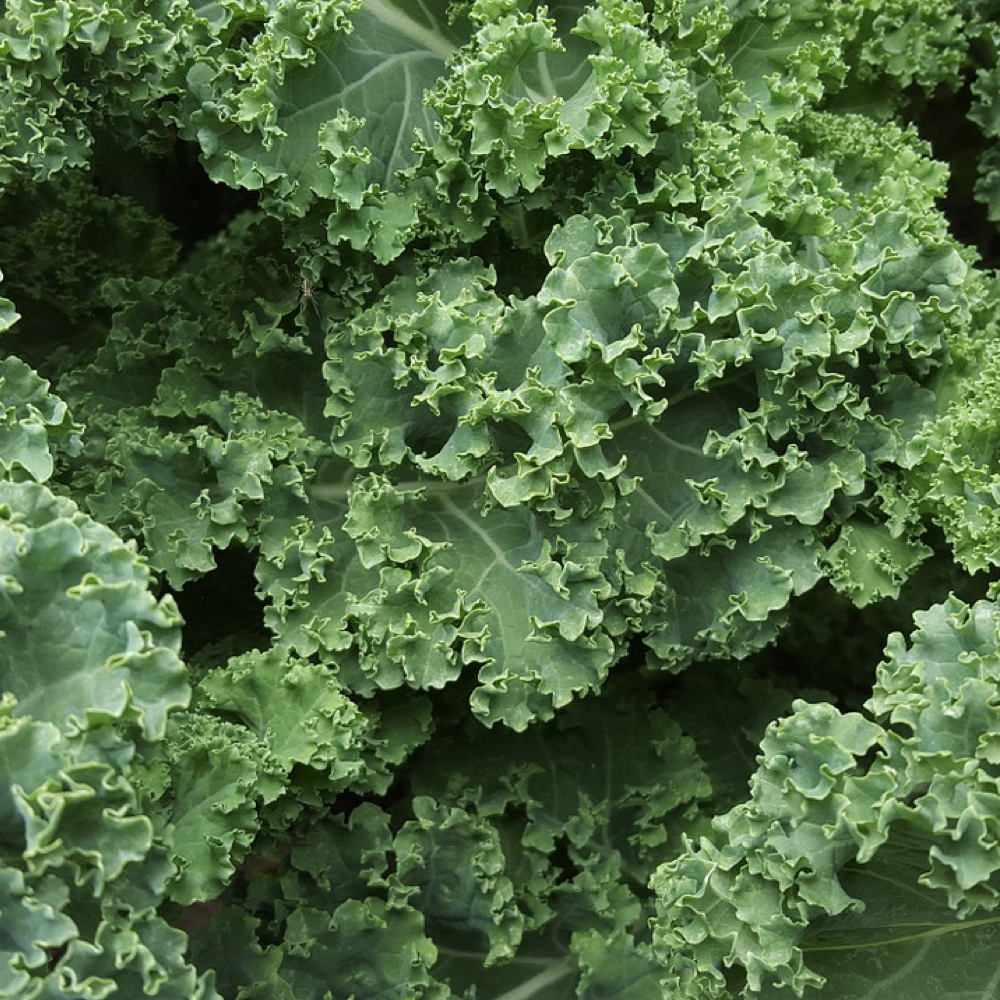
Kale
Topic summary contributed by volunteer(s): Randy
Kale is a dark leafy green, cruciferous vegetable, and an excellent choice for one of our nine a day servings of fruits and vegetables. It is a good source of antioxidants, calcium, nitrates, skin-enhancing carotenoids and other phytonutrients such as lutein and zeaxanthin, which may be protective against glaucoma. Unfortunately, kale is not common in the American diet.
Like other cruciferous vegetables, it may boost mood, lower cholesterol, prevent DNA damage, improve immune function, prevent cancer (like breast and kidney cancer) increase cancer survival rates, and reduce the risk of chronic age-related diseases.
Kale is one of the more effective bile acid-binding vegetables, which may play a role in lowering the risk of premature degenerative diseases. To avoid interfering with thyroid function, a person must be careful not to eat too much of it raw. Chopping it and then waiting at least 40 minutes before cooking it or mixing some mustard powder to cooked kale helps produce the anti-cancer nutrient, sulforaphane. Kale chips can be both a healthy and delicious snack.
For substantiation of any statements of fact from the peer-reviewed medical literature, please see the associated videos below.
Image Credit: Pixabay. This image has been modified.
Popular Videos for Kale


The Benefits of Kale and Cabbage for Cholesterol
Dinosaur kale and red cabbage are put to the test.All Videos for Kale
-

What Are Ultra-Processed Foods?
How exactly is “ultra-processed” defined?
-

Healthy, Easy Recipes: Black Bean Stew, Kale Salad, and Molasses Cookies
Recipes from my new How Not to Age cookbook
-

Ultra-Processed Foods: Concerns, Controversies, and Exceptions
What is the role of ultra-processed plant-based products in the diet?
-

Can Goitrogens in Soy and Cruciferous Vegetables Interfere with Thyroid Function?
What is the controversy over soy food consumption in those with subclinical hypothyroidism?
-

The Best Way to Cook Vegetables
Which method of cooking vegetables preserves the most antioxidants?
-

The Growth and Nutrient Intakes of Children Raised on Plant-Based Diets
How can we plan well-balanced plant-based diets for infants and kids?
-

How to Boost Collagen Synthesis with Diet
Which foods can increase collagen deposition and prevent wrinkles?
-

Greens, Green Tea, and Nuts Put to the Test for Telomeres
Not all plant foods are linked to less cellular aging based on telomere attrition, and not all animal foods are linked to more.
-

The Fat-Blocking and Appetite-Suppressing Effects of Thylakoids
What is a natural way to cut down on unhealthy food cravings?
-

Do Vegans Have Lower Bone Density and More Fractures?
What are the bone fracture rates of omnivores vs. vegetarians vs. vegans?
-

The Purported Benefits of Vitamin K2: Should You Take Supplements?
Our body can make vitamin K2 from the K1 in green leafy vegetables.
-

The Benefits of Moringa: Is It the Most Nutritious Food?
Does the so-called miracle tree live up to the hype?
-

The 5:2 Diet and the Fasting-Mimicking Diet Put to the Test
The effects of eating only 5 days a week or a fasting-mimicking diet 5 days a month.
-

Evidence-Based Weight Loss – Live Presentation
In this live presentation, Dr. Greger offers a sneak peek into his book How Not to Diet.
-

Does Pressure Cooking Preserve Nutrients?
How Dr. Greger pressure steams his greens.
-

Recipe: Veggie Mac & Cheese
A cruciferous spin on macaroni and cheese, this recipe takes comfort food to a whole new level, and is a tasty way to check off a few servings on the Daily Dozen checklist. This recipe comes from Kristina, our Social Media Director.
-

Kidney Stones and Spinach, Chard, and Beet Greens: Don’t Eat Too Much
Given their oxalate content, how much is too much spinach, chard, beet greens, chaga mushroom powder, almonds, cashews, star fruit, and instant tea?
-

How to Cook Greens
Dark green leafy vegetables are the most nutrient-dense foods on the planet. What’s the best way to prepare them?
-

Dairy and Cancer
How do we explain the increased risk of prostate cancer but the decreased risk of colon cancer associated with dairy consumption?
-

Do Lutein Supplements Help with Brain Function?
Avocados, greens, and lutein and zeaxanthin supplements are put to the test for improving cognitive function.
-

Brain-Healthy Foods to Fight Aging
What is the best source of lutein, the primary carotenoid antioxidant in the brain?
-

Best Brain Foods: Berries and Nuts Put to the Test
Randomized controlled studies put nuts, berries, and grape juice to the test for cognitive function.
-

Pros and Cons of a Macrobiotic Diet
What happens when you put diabetics on a diet composed of largely whole grains, vegetables, and beans?
-

Bean Pastas and Lentil Sprouts
Do the benefits of beans, and lentils, and chickpeas remain when they’re powdered? Also, how to use temperature stress to boost sprout nutrition.
-

The Benefits of Kale and Cabbage for Cholesterol
Dinosaur kale and red cabbage are put to the test.
-

Dr. Greger’s Daily Dozen Checklist
In my book How Not to Die, I center my recommendations around a Daily Dozen checklist of everything I try to fit into my daily routine.
-

Dr. Greger in the Kitchen: My New Favorite Beverage
Dr. Greger blends up a vegetable smoothie inspired by a recipe in his How Not to Die Cookbook.
-

Fighting Autism Brain Inflammation with Food
One food may be able to combat all four purported causal factors of autism: synaptic dysfunction, oxidative stress, mitochondrial dysfunction, and neuroinflammation.
-

Fever Benefits for Autism in a Food
Dramatic improvements in autistic children when they have a fever suggest that the disease may be reversible if one can replicate the phenomenon in other ways.
-

Dr. Greger’s Daily Dozen Checklist
In my book How Not to Die, I center my recommendations around a Daily Dozen checklist of all the things I try to fit into my daily routine.
-

Best Food to Counter the Effects of Air Pollution
There is a food that offers the best of both worlds—significantly improving our ability to detox carcinogens like diesel fumes and decreasing inflammation in our airways—all while improving our respiratory defenses against infections.
-

Animal Protein, Pregnancy, and Childhood Obesity
What pregnant women eat may affect even the health of their grandchildren.
-

The Risks and Benefits of Sensible Sun Exposure
We don’t have to choose between the lesser of two evils: skin cancer versus internal cancers from vitamin D deficiency.
-

How to Regenerate Coenzyme Q10 (CoQ10) Naturally
Chlorophyll in our bloodstream after eating greens may react with wavelengths of sunlight that penetrate through our skin to reactivate the antioxidant Coenzyme Q10 (ubiquinol).
-

Using the Produce Aisle to Boost Immune Function
Vegetables tested head-to-head to see which boosts immune function best.
-

Industry Response to Plants Not Pills
The whole food is greater than the sum of its parts: how unscrupulous marketers use evidence that ties high blood levels of phytonutrients with superior health to sell dietary supplements that may do more harm than good.
-

Can Diet Protect Against Kidney Cancer?
Plant-based diets appear to protect against renal cell carcinoma both directly and indirectly.
-

Cooked Beans or Sprouted Beans?
How do canned versus germinated beans (such as sprouted lentils) compare when it comes to protecting brain cells and destroying melanoma, kidney, and breast cancer cells.
-

How to Diagnose Gluten Intolerance
After a formal evaluation to rule out celiac disease, those who suspect they might have gluten sensitivity should first try improving their diet and then have other causes excluded before going on a gluten-free diet, since as many as 1 in 3 people who avoid gluten for symptom control end up having a different disease altogether.
-

Second Strategy to Cooking Broccoli
Adding myrosinase enzymes in the form of even a pinch of mustard powder to cooked cruciferous (cabbage-family) vegetables like kale, collards or Brussels sprouts can offer anti-cancer sulforaphane levels comparable to raw, removing the necessity to pre-chop for maximum health benefits.
